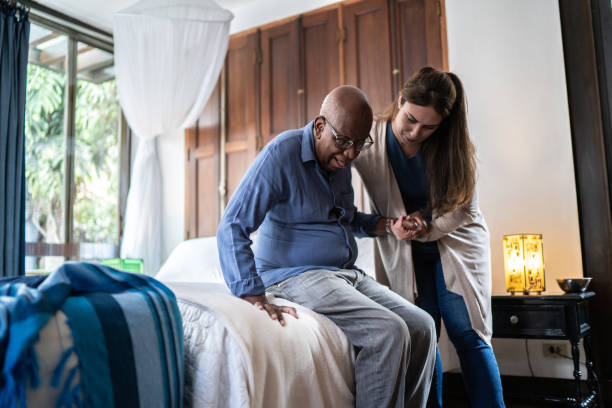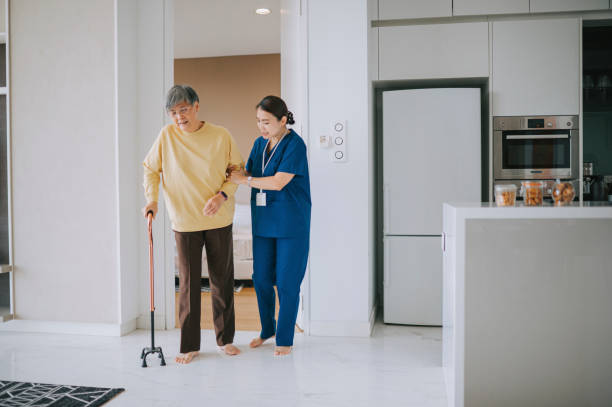As people age, maintaining heart health becomes increasingly critical. Seniors face a higher risk of cardiovascular diseases such as hypertension, heart failure, and coronary artery disease, which can significantly impact their quality of life.
Fortunately, home health care plays a vital role in promoting heart health for older adults, ensuring they receive personalized, ongoing care in the comfort of their homes. From monitoring vital signs to assisting with medication adherence and encouraging heart-healthy lifestyles, home health care professionals provide essential support that can lead to better heart health outcomes.
Contents
Understanding the Importance of Heart Health in Seniors
Heart disease remains one of the leading causes of death among seniors. As the body ages, the cardiovascular system changes, including stiffening arteries, reduced cardiac efficiency, and an increased risk of high blood pressure. These changes make seniors more vulnerable to heart-related complications such as strokes, heart attacks, an d arrhythmias.
The key to preventing heart disease in older adults lies in regular monitoring, early detection of risk factors, and consistent management of existing conditions. However, many seniors face mobility issues, chronic illnesses, and cognitive decline, making it difficult to manage their heart health independently. This is where home health care services step in, providing the necessary medical attention and lifestyle guidance to keep seniors’ hearts strong and healthy.
How Home Health Care Benefits Heart Health in Seniors

1. Personalized Health Monitoring
One of the most critical aspects of home health care is continuous monitoring. Healthcare professionals regularly check a senior’s blood pressure, heart rate, blood sugar levels, and weight—all crucial indicators of heart health. By detecting changes early, interventions can be made before a condition worsens.
For example, home nurses or caregivers can track a patient’s blood pressure trends and notify a doctor if they observe persistent hypertension, ensuring timely medication adjustments or lifestyle changes.
2. Medication Management and Adherence
Many seniors with heart disease require multiple medications to manage their conditions. However, forgetting doses, taking incorrect amounts, or mixing medications improperly can lead to severe health risks, including irregular heartbeats, blood clots, or strokes.
Home health care professionals ensure that seniors:
- Take the right medications at the correct times
- Receive medication reminders and proper dosage instructions
- Avoid harmful drug interactions
- Refill prescriptions on time
This structured approach improves medication adherence, preventing complications and ensuring effective management of heart disease.
3. Nutritional Guidance for a Heart-Healthy Diet
Diet plays a pivotal role in maintaining cardiovascular health. A home health aide or nurse can work with a nutritionist to create a heart-healthy meal plan tailored to a senior’s specific dietary needs.
Key dietary recommendations include:
- Low sodium intake to manage blood pressure
- High-fiber foods to reduce cholesterol
- Healthy fats (e.g., olive oil, nuts, and avocados) for optimal heart function
- Adequate hydration to maintain blood circulation
Home caregivers help reduce the risk of heart disease progression by ensuring seniors follow these guidelines.
4. Encouraging Physical Activity
Regular physical activity helps maintain cardiovascular health by improving circulation, strengthening the heart muscle, and reducing stress. However, many seniors may find it difficult to stay active due to limited mobility or chronic pain.
Home health professionals can:
- Assist seniors with doctor-approved exercise routines
- Encourage light activities such as walking, stretching, or chair exercises
- Help prevent falls or injuries during movement
Even small amounts of daily activity can lead to significant improvements in heart health.
5. Emotional and Mental Well-Being Support
Heart health is not just about physical well-being—mental and emotional health also play crucial roles. Stress, depression, and loneliness can contribute to high blood pressure and inflammation, both of which are linked to heart disease.
Home caregivers provide:
- Companionship to reduce loneliness
- Emotional support to help seniors cope with stress and anxiety
- Mental stimulation activities to keep their minds engaged
Home care professionals help seniors maintain a healthy heart-mind connection by fostering a positive emotional environment.
6. Education and Preventative Care
Home health care is not just about treatment; it’s about empowering seniors with knowledge. Caregivers educate seniors on the following:
- Recognizing early signs of heart disease (e.g., chest pain, shortness of breath, swelling in legs)
- Understanding the importance of regular check-ups
- Adopting lifestyle changes that improve long-term heart health
Educated seniors and their families are better equipped to make informed health decisions, leading to improved outcomes.
The Future of Home Health Care in Heart Disease Prevention
With telehealth and remote monitoring advancements, home health care is becoming even more efficient in managing heart disease. Devices such as smart blood pressure monitors, wearable ECGs, and digital health apps enable caregivers to track real-time heart health data, allowing for early intervention without frequent hospital visits.
Additionally, virtual consultations with doctors and nutritionists ensure that seniors receive consistent medical guidance while staying in their homes. These innovations are making home health care more accessible, convenient, and effective in preventing and managing heart disease in seniors.
Conclusion
Home health care is a lifesaving service for seniors, providing them with the necessary support to maintain heart health, prevent complications, and improve their overall well-being. Through regular health monitoring, medication management, heart-healthy meal planning, physical activity encouragement, emotional support, and education, home caregivers play an essential role in reducing the risks of cardiovascular diseases.
As heart disease remains a leading concern for seniors, home health care ensures they receive personalized, proactive, and compassionate care that helps them lead healthier, longer lives. With ongoing advancements in healthcare technology, the future of home-based heart care looks even more promising, making it an essential component of senior healthcare strategies.

